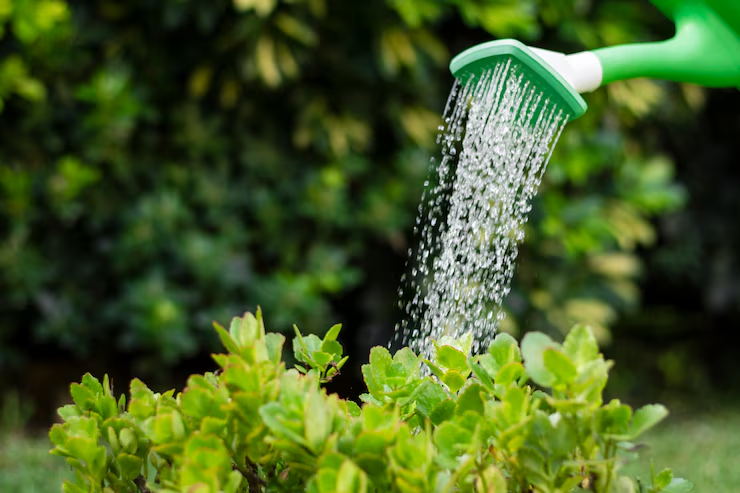Watering your plants sounds easy — until you’re either drowning them or letting them dry into crispy sadness. Every plant has its own needs, and sticking to a one-size-fits-all schedule can do more harm than good.
But don’t worry — creating a personalized, realistic watering routine is completely doable. In this article, you’ll learn how to build a low-stress, plant-friendly watering schedule that helps your green friends thrive (without making you feel like a full-time gardener).
Why Watering Is Tricky (But Important)
Water is life — but too much or too little can quickly cause:
- 🟡 Yellowing leaves
- 🔄 Leaf curl or drop
- 🟤 Root rot or dryness
- 🐛 Pests like fungus gnats
The right watering routine prevents stress, supports growth, and keeps your plants looking vibrant year-round.
Step 1: Group Plants by Watering Needs
Don’t treat every plant the same. Group them by how often they like to drink.
💧High-Need Plants (Water Weekly or More)
- Ferns
- Calatheas
- Peace Lilies
- Fittonia
- Herbs (indoors)
🌿 Medium-Need Plants (Every 7–10 Days)
- Pothos
- Philodendron
- Rubber Plant
- Fiddle Leaf Fig
- Spider Plant
🌵 Low-Need Plants (Every 2–4 Weeks)
- Succulents
- Cacti
- Snake Plant
- ZZ Plant
- Jade Plant
Tip: Create plant “care zones” in your home based on their needs to simplify your routine.
Step 2: Check Before You Water
Instead of watering on a fixed day no matter what, always check the soil first.
Easy methods:
- Stick your finger 1–2 inches into the soil. If it’s dry, it’s time to water.
- Use a moisture meter for more precise readings
- Watch for clues: drooping, curling, or dry leaves can indicate thirst
If the soil is still moist, wait a day or two — it’s better to underwater than overwater in most cases.
Step 3: Choose the Right Watering Tools
Basic gear to keep handy:
- A small watering can with a narrow spout
- A spray bottle for misting humidity-loving plants
- A moisture meter for consistent checks
- A catch tray or saucer under every pot
Optional but helpful: A water reminder app like Planta, Greg, or a phone calendar alert.
Step 4: Create a Weekly Watering Plan
Now that you’ve grouped your plants and know how to check them, build a flexible schedule that fits your life.
Example weekly routine:
- Monday: Check and water tropicals (calathea, peace lily)
- Thursday: Check medium-needs plants (rubber plant, pothos)
- Every other Sunday: Check low-needs plants (succulents, snake plant)
- Daily or every 2 days: Mist humidity-lovers in dry climates
Pro Tip: Create a checklist and keep it near your plants, so you can track who’s been watered and when.
Step 5: Adjust for Seasons
Your plant’s watering needs change throughout the year.
🌞 Spring/Summer:
- Faster growth
- Warmer temps
- More watering needed
❄️ Fall/Winter:
- Dormant periods
- Less sunlight
- Cut watering in half or more
Always use the soil-check rule — never water on autopilot.
Step 6: Use Smart Watering Techniques
It’s not just when you water — it’s how you do it.
Watering do’s:
✅ Water thoroughly until it drains from the bottom
✅ Use room-temperature water
✅ Let excess water drain — never let plants sit in standing water
✅ Water the soil, not the leaves
Watering don’ts:
🚫 Don’t mist succulents or cacti
🚫 Don’t use cold tap water on tropicals
🚫 Don’t “top off” water frequently — this causes salt buildup
Step 7: Track and Tweak
No schedule is perfect from day one — but consistency helps you notice patterns.
Keep a simple watering log:
| Plant | Last Watered | Next Check | Notes |
| Snake Plant | April 5 | April 20 | Soil still damp |
| Pothos | April 8 | April 14 | Growing fast — added misting |
| Peace Lily | April 10 | April 14 | Needed more light |
Tracking = less guessing = healthier plants.
Make Watering Easy, Not Stressful
You don’t need to memorize a million plant rules — just follow these basics:
- Group plants by needs
- Check soil before watering
- Create a flexible, seasonal routine
- Adjust and learn over time
Soon, watering will become second nature — a calming habit instead of a chore. And your plants? They’ll thank you with lush leaves, happy blooms, and serious jungle vibes.

